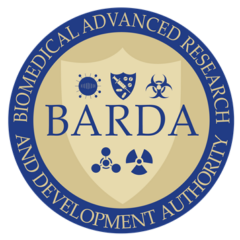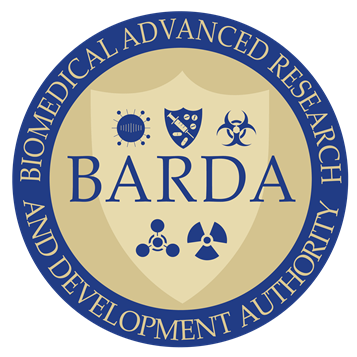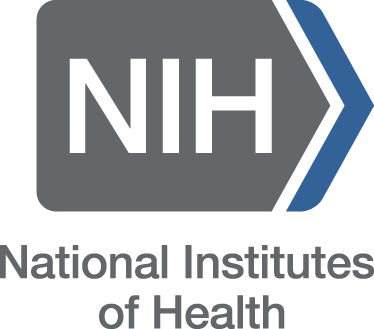Pipeline
Our goal is to transform the lives of patients by focusing on cancers and infectious diseases where multispecific medicines and vaccines hold great promise.
Promising Immunology Pipeline of Potential First-in-Class Drugs
MDX2201
Epstein-Barr virus (EBV) is the major cause of infectious mononucleosis and is associated with several human cancers and multiple sclerosis. Despite its prevalence and health impact, there are currently no vaccines or treatments.
Four viral glycoproteins (gp); gp350, gH, gL, and gp42, mediate entry into the major sites of viral replication – B cells, and epithelial cells. Vaccine comprised of a single chain gH / gL / gp42 protein that was fused to bacterial ferritin to form a self-assembling nanoparticle displaying these proteins elicits potent neutralizing antibodies that protect against infection in vivo.
We are utilizing a synthetic approach to designing the EBV immunogens, based on understanding of structural biology and nanotechnology to optimize presentation of four viral glycoproteins (gp), gp350 and gH / gL / gp42 in their native conformation in a symmetrical array.

MDX2001
Many solid tumors – the majority of cancers – are associated with poor long-term survival and standard of care treatments do not induce complete and sustained remission. Lung cancer patients, for example, have < 30% chance of long-term survival even with immune modulator therapy.
Failure to achieve or maintain a response to therapy in solid tumors is often driven by loss of tumor antigen expression. We are targeting two tumor antigens overexpressed in several types of solid tumors and a dual-targeting strategy may prevent loss of therapeutics response due to loss of antigen expression.
MDX2001 is a tetraspecific antibody designed to optimize T cell function while preventing tumor antigen escape. Our multispecific antibody format allows MDX2001 to simultaneously engage with two T cell receptors and two tumor antigens.

MDX2004
Cancer immunotherapy has achieved notable clinical success; however, complete and durable responses are observed in only a subset of patients. This limited efficacy is primarily attributed to inadequate generation and functional impairment of effector and memory T cells with anti-tumor activity.
Immunotherapy relies on the recruitment or expansion of tumor-specific T cells to eradicate cancer cells. Effective T cell activation, cytotoxic function, and survival require signaling through CD3 and CD28, which can be further enhanced by 4-1BB costimulation to induce stem-like T cells.
MDX2004 is a novel trispecific antibody–fusion protein that targets CD3, CD28, and 4-1BB (CD137) on human T cells. It is designed to promote the expansion of stem and memory T cell populations, thereby rejuvenating immune function and enhancing anti-tumor immunity. This trifunctional approach aims to both expand and sustain these T cell subsets, which have been associated with favorable responses to immunotherapy. In addition, it may help restore immune function in subjects with underlying immune impairment from aging, chronic infections or chemotherapies.

MDX2003
Response rates to B cell lymphomas / leukemias vary and despite an overall 5-year survival of 71%, relapse and emergence of resistance is common. Relapse and resistance can be due to tumor heterogeneity (resistant clones emerge) and loss of target antigen. CAR-T therapies used for relapsed / refractory cases yield complete remission in < 50% cases overall, but CAR-T cells are difficult to produce and impractical for large scale use. Relapsed / refractory B cell tumors remain a large unmet need.
We are targeting two tumor antigens that are highly expressed on most malignant B cells and a dual-targeting strategy minimizes chance of resistance due to tumor heterogeneity or downregulation of the targets.
MDX2003 is a tetraspecific antibody designed to optimize sustained T cell function by dual-stimulating T cells via one receptor and enhancing survival via the other receptor. The MDX2003 molecule preferentially kills tumor cells over normal B cells. It is potentially the first candidate to target two tumor antigens at the same time as dual T-cell signaling / survival stimulators.

MDX2301
The rapid spread of the severe acute respiratory syndrome coronavirus 2 (SARS-CoV-2) B.1.1.529 (Omicron) variant and its resistance to neutralization by vaccines and convalescent sera are driving a search for more broadly neutralizing monoclonal antibodies with high potency. Multiple monoclonal antibodies for SARS-Co-V2 have been developed and received an Emergency Use Authorization (EUA) for prophylaxis as well as in the early- or late-disease therapeutic settings, but most of these have been pulled off the market as they are no longer effective against currently circulating dominant omicron variants. New antibodies are needed for prophylaxis or treatment to address emerging SARS-CoV-2 strains.
Our multispecific Abs potently neutralize Omicron variants with a potency and breadth superior to authorized mAbs and multi-specificity that provides greater potential to cover emerging SARS-CoV-2 variants.
Our multispecific platform allows the rational selection of combining sites to optimize coverage of present and future virus variants. Synergistic neutralization leads to improved potency and lower therapeutic dose. The technology is amenable to single injection outpatient treatment.




Partnerships
Our goal is to accelerate the potential clinical impact of our multispecific and ferritin nanoparticle platforms through partnerships that allow us to drive the rapid advancement of our pipeline.
We seek out collaborations with leading biopharmaceutical companies and academic institutions. Our team of leading, world-renowned scientists acts as a “brain trust” in areas of research where we have decades of expertise, which is a perfect complement to our partners’ clinical development and commercial expertise.
Partner with us: partnership@modextx.com